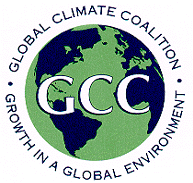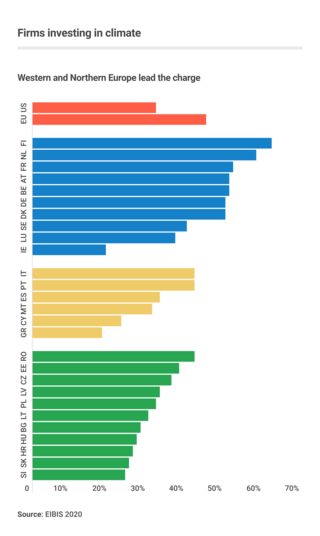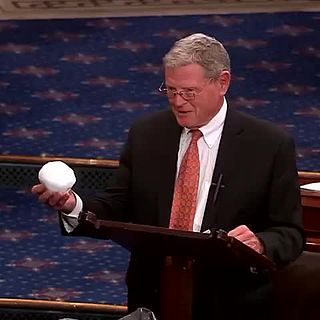Related Research Articles

The Global Climate Coalition (GCC) (1989–2001) was an international lobbyist group of businesses that opposed action to reduce greenhouse gas emissions and engaged in climate change denial, publicly challenging the science behind global warming. The GCC was the largest industry group active in climate policy and the most prominent industry advocate in international climate negotiations. The GCC was involved in opposition to the Kyoto Protocol, and played a role in blocking ratification by the United States. The coalition knew it could not deny the scientific consensus, but sought to sow doubt over the scientific consensus on climate change and create manufactured controversy.

The American Geophysical Union (AGU) is a 501(c)(3) nonprofit organization of Earth, atmospheric, ocean, hydrologic, space, and planetary scientists and enthusiasts that according to their website includes 130,000 people. AGU's activities are focused on the organization and dissemination of scientific information in the interdisciplinary and international fields within the Earth and space sciences. The geophysical sciences involve four fundamental areas: atmospheric and ocean sciences; solid-Earth sciences; hydrologic sciences; and space sciences. The organization's headquarters is located on Florida Avenue in Washington, D.C.
Myron Ebell is an American climate change denier who served as the Director of Global Warming and International Environmental Policy at the Competitive Enterprise Institute (CEI), an American libertarian advocacy group based in Washington, D.C. He was also chairman of the Cooler Heads Coalition, a politically conservative group formed in 1997 focused on "dispelling the myths of global warming by exposing flawed economic, scientific, and risk analysis". In September 2016, Ebell was appointed by then Republican presidential candidate Donald Trump to lead his transition team for the United States Environmental Protection Agency (EPA).
The American Petroleum Institute (API) is the largest U.S. trade association for the oil and natural gas industry. It claims to represent nearly 600 corporations involved in production, refinement, distribution, and many other aspects of the petroleum industry.

Climate change mitigation (or decarbonisation) is action to limit the greenhouse gases in the atmosphere that cause climate change. Climate change mitigation actions include conserving energy and replacing fossil fuels with clean energy sources. Secondary mitigation strategies include changes to land use and removing carbon dioxide (CO2) from the atmosphere. Current climate change mitigation policies are insufficient as they would still result in global warming of about 2.7 °C by 2100, significantly above the 2015 Paris Agreement's goal of limiting global warming to below 2 °C.

Business action on climate change is a topic which since 2000 includes a range of activities relating to climate change, and to influencing political decisions on climate change-related regulation, such as the Kyoto Protocol. Major multinationals have played and to some extent continue to play a significant role in the politics of climate change, especially in the United States, through lobbying of government and funding of climate change deniers. Business also plays a key role in the mitigation of climate change, through decisions to invest in researching and implementing new energy technologies and energy efficiency measures.

Rex Wayne Tillerson is an American energy executive who served as the 69th United States secretary of state from 2017 to 2018 in the administration of Donald Trump. From 2006 to 2016, he was chairman and chief executive officer (CEO) of ExxonMobil.

Jeremy Leggett is a British social entrepreneur and writer. He founded and was a board director of Solarcentury from 1997 to 2020, an international solar solutions company, and founded and was chair of SolarAid, a charity funded with 5% of Solarcentury's annual profits that helps solar-lighting entrepreneurs get started in Africa (2006–2020). SolarAid owns a retail brand SunnyMoney that was for a time Africa's top-seller of solar lighting, having sold well over a million solar lights, all profits recycled to the cause of eradicating the kerosene lantern from Africa.

The fossil fuels lobby includes paid representatives of corporations involved in the fossil fuel industry, as well as related industries like chemicals, plastics, aviation and other transportation. Because of their wealth and the importance of energy, transport and chemical industries to local, national and international economies, these lobbies have the capacity and money to attempt to have outsized influence on governmental policy. In particular, the lobbies have been known to obstruct policy related to environmental protection, environmental health and climate action.

Climate change denial is a form of science denial characterized by rejecting, refusing to acknowledge, disputing, or fighting the scientific consensus on climate change. Those promoting denial commonly use rhetorical tactics to give the appearance of a scientific controversy where there is none. Climate change denial includes unreasonable doubts about the extent to which climate change is caused by humans, its effects on nature and human society, and the potential of adaptation to global warming by human actions. To a lesser extent, climate change denial can also be implicit when people accept the science but fail to reconcile it with their belief or action. Several studies have analyzed these positions as forms of denialism, pseudoscience, or propaganda.
Flannery is a convention in the game of contract bridge.

Kivalina v. ExxonMobil Corp., No. 4:08-cv-01138, is a lawsuit filed on February 26, 2008, in a United States district court. The suit, based on the common law theory of nuisance, claims monetary damages from the energy industry for the destruction of Kivalina, Alaska by flooding caused by climate change. The damage estimates made by the U.S. Army Corps of Engineers and the Government Accountability Office are placed between $95 million and $400 million. This lawsuit is an example of greenhouse gas emission liability.

ExxonMobil Corporation is an American multinational oil and gas corporation and the largest direct descendant of John D. Rockefeller's Standard Oil. The company, which took its present name in 1999 per the merger of Exxon and Mobil, is vertically integrated across the entire oil and gas industry, and within it is also a chemicals division which produces plastic, synthetic rubber, and other chemical products. ExxonMobil is headquartered near the Houston suburb of Spring, Texas, though officially incorporated in the U.S. state of New Jersey. The company is the largest oil and gas company based in the US, America's third largest by revenue among all industries, and the eighth largest in the world.

In 2019, the total energy production in Indonesia is 450.79 million tonnes of oil equivalent, with a total primary energy supply of 231.14 million tonnes of oil equivalent and electricity final consumption of 263.32 terawatt-hours. From 2000 to 2021, Indonesia's total energy supply increased by nearly 60%.

As the world's largest majority investor-owned oil and gas corporation, ExxonMobil has received significant amounts of controversy and criticism, mostly due to its activities which increase the speed of climate change and its denial of global warming.

From the 1980s to mid 2000s, ExxonMobil was a leader in climate change denial, opposing regulations to curtail global warming. For example, ExxonMobil was a significant influence in preventing ratification of the Kyoto Protocol by the United States. ExxonMobil funded organizations critical of the Kyoto Protocol and seeking to undermine public opinion about the scientific consensus that global warming is caused by the burning of fossil fuels. Of the major oil corporations, ExxonMobil has been the most active in the debate surrounding climate change. According to a 2007 analysis by the Union of Concerned Scientists, the company used many of the same strategies, tactics, organizations, and personnel the tobacco industry used in its denials of the link between lung cancer and smoking.
Carbon Tracker is a London-based not-for-profit think tank researching the impact of climate change on financial markets.

Darren Wayne Woods is an American businessman who is the chief executive officer (CEO) and chairman of ExxonMobil since January 1, 2017.
ExxonMobil, an American multinational oil and gas corporation presently based out of Texas, has had one of the longest histories of any company in its industry. A direct descendant of John D. Rockefeller's Standard Oil, the company traces its roots as far back as 1866 to the founding of the Vacuum Oil Company, which would become part of ExxonMobil through its own merger with Mobil during the 1930s. The present name of the company comes from a 1999 merger of Standard Oil's New Jersey and New York successors, which adopted the names Exxon and Mobil respectively throughout the middle of the 20th century. Because of Standard Oil of New Jersey's ownership over all Standard Oil assets at the time of the 1911 breakup, ExxonMobil is seen by some as the definitive continuation of Standard Oil today.

District of Columbia v. Exxon Mobil Corp. is an ongoing lawsuit filed against Exxon Mobil Corporation and ExxonMobil Oil Corporation by the District of Columbia (D.C.). This case is one of a long list of lawsuits filed against ExxonMobil including environmental and ethical wrongdoings.
References
- ↑ "Brian Flannery". Archived from the original on November 17, 2016. Retrieved November 16, 2016.
- ↑ Flannery, B. P. (1974). Gas flow in cataclysmic variable stars (PhD). University of California, Santa Cruz. Bibcode:1974PhDT.........4F.
- ↑ "Brian Flannery". 15 September 2015. Retrieved November 16, 2016.
- ↑ "Working Group III: Mitigation. List of Authors and Reviewers" . Retrieved November 16, 2016.
- ↑ McJeon, Haewon; Edmonds, Jae; Bauer, Nico; Clarke, Leon; Fisher, Brian; Flannery, Brian P.; Hilaire, Jérôme; Krey, Volker; Marangoni, Giacomo; Mi, Raymond; Riahi, Keywan; Rogner, Holger; Tavoni, Massimo (15 October 2014), "Limited impact on decadal-scale climate change from increased use of natural gas" (PDF), Nature , 514 (7523): 482–485, Bibcode:2014Natur.514..482M, doi:10.1038/nature13837, hdl: 11311/961655 , PMID 25317557, S2CID 4454295
- ↑ Ward, Bob (July 1, 2009). "Why ExxonMobil must be taken to task over climate denial funding". The Guardian.
- ↑ Leggett, Jeremy (1999). The Carbon War: Dispatches from the End of the Oil Century. London: Allen Lane. p. 173.